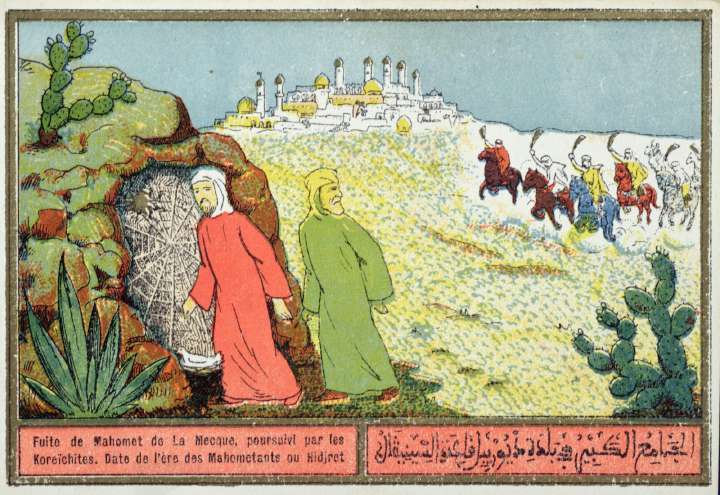Does Islam Prohibit Images of Mohammed? Nope. Does It Command Death to Blasphemers? Nope.

Over at On Faith, American-Iranian Muslim Omid Safi points out that the idea that Islam forbids depicting the prophet Mohammed is wrong.
That is actually not the case, and marks yet another example of what is at worst an acute sense of religious amnesia, and at best a distortion of the actual history of Islamic practices: Over the last thousand years, Muslims in India, Afghanistan, Iran, Central Asia and Turkey did have a rich courtly tradition of depicting the various prophets, including Prophet Muhammad, in miniatures.
These miniatures were patronized by pious Muslim rulers, and were often richly illustrated with verses from the Qur'an, and the biography of the Prophet's life. Yet very few Muslims today, and even fewer non-Muslims, are aware of this rich heritage.
As the Washington Post pointed out in 2006, when the first controversy over the Danish "Mohammed cartoons" was building, "There are numerous examples in public institutions in Istanbul, Vienna, Edinburgh, London, Dublin, Los Angeles and New York. Four are here in Washington in the Smithsonian Institution on the Mall. Three are in the Freer Gallery of Art. The fourth is next door in the Freer's sister museum, the Arthur M. Sackler Gallery."
The Mohammed Image archive has a robust archive of images depicting Islam's main prophet. Click on image for more examples.
Well, what about images of Mohammed that mock or deride the man and his religion? There's no question that many Islamic countries have laws mandating all sorts of punishments, including death, for blasphemy and apostasy. Writing in USA Today, Britain-based cleric Anjme Choudary flatly asserts
Muslims consider the honor of the Prophet Muhammad to be dearer to them than that of their parents or even themselves. To defend it is considered to be an obligation upon them. The strict punishment if found guilty of this crime under sharia (Islamic law) is capital punishment implementable by an Islamic State. This is because the Messenger Muhammad said, "Whoever insults a Prophet kill him."
That interpretation of Islam is far from universal. Ro Waseem argues
Quite frankly, blasphemy and apostasy laws are themselves blasphemous to the teachings of the Qur'an. Not in the traditional sense, but because they violate the very instructions the scripture gives regarding freedom of belief.
Regarding apostasy, in Quran 2:256 God says, "There is no compulsion in matters of faith….
In a similar vein, verse 109:6 instructs adherents to end a debate by saying: "To you, your belief system. And to me, mine."…
When it comes to blasphemy, I often hear some version of, "Hold on. If someone mocks my religion, it prompts me to act violently. You see, it makes me very emotional."
But this statement only shows an ignorance of the Quran, which says in verse 6:68, "When you see them engaged in vain discourse about Our verses, turn away from them unless they engage in a different subject….
And, again, Quran 28:55 instructs, "Whenever they (believers) hear vain talk of ridicule, they withdraw from it decently and say, '"To us our deeds and to you yours; Peace be upon you, we do not seek to join the ignorant."
Waseem notes
The blasphemy and apostasy laws are found in the Hadeeth, sayings attributed to Prophet Mohammad, which were compiled two-three centuries after his death. Muslims know that no Hadeeth should contradict the Quran if they are to be accepted, given their subjective nature and reliance on the Quran for authenticity.
Well, if the history of Christian martyrdom teaches us anything, it's that explication de texte rarely carries the day in the face of violence and superior numbers. But the Catholic Church did eventually grow to accept co-existence with Protestant sects, and Protestant sects with other Protestant sects, and Europe and America allowed religious tolerance that included Jews, atheists, "Mohammedans," and others. There's no question that arguments about theology and the right on conscience made a huge difference over time. Ideas matter.
Especially as the radical elements of Islam become violent and desperate in their attempts to engender Ummah, it's important to stress that their interpretations are one among many and anything but universal. At least since the 9/11 attacks, an ongoing query in America and the West more broadly has been, "Where are the moderate Muslims?" They're out there, for sure, and we'd all be better off creating a dialogue in which the anti-modernity Islamists are recognized as a common enemy.


Show Comments (292)